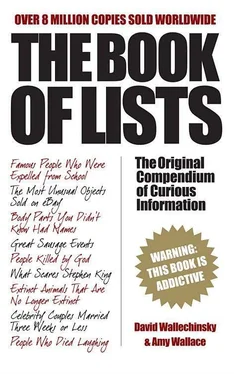9. BERTRAND RUSSELL
Once in the 1930s, while the English philosopher was visiting Beijing, he became very ill. Japanese reporters in the city constantly tried to see Russell, but were always denied access to him. The journalists decided he must be dead and notified their newspapers of his demise. Word of his death went around the world. Wrote Russell, ‘It provided me with the pleasure of reading my obituary notices, which I had always desired without expecting my wishes to be fulfilled. One missionary paper had an obituary notice of one sentence: ‘Missionaries may be pardoned for heaving a sigh of relief at the news of Mr Bertrand Russell’s death.’ All this inspired Russell to compose his own obituary in 1937 for The Times of London. He wrote of himself: ‘His life, for all its waywardness, had a certain anachronistic consistency, reminiscent of the aristocratic rebels of the early nineteenth century… He was the last survivor of a dead epoch.’
He told The Times to run it in 1962, the year in which he expected to die. The Times did not need it until 1970.
10. EDWARD V. RICKENBACKER
The former auto-racing driver turned fighter pilot emerged from WWI as America’s leading ace, with 26 confirmed kills. In peacetime he was an executive in the automobile and aviation industries. With the onset of WWII, Rickenbacker volunteered to carry out missions for the US War Dept. In October 1942, on an inspection tour, Rickenbacker’s B-17 went down somewhere in the Pacific Ocean. An intensive air search of the area was made. There was no sign of survivors. Newspapers across the US declared Rickenbacker dead. The following month, on Friday 13 November, there were new headlines. Rickenbacker and seven others were spotted alive in the Pacific. They had survived on a raft for 23 days. Waiting for Rickenbacker when he returned home was a pile of his obituaries. One, in the New York Daily News , was a cartoon showing a black wreath floating on water, with the caption ‘So Long, Eddie’. Another, in the New York Journal , bore the headline ‘End of the Roaring Road?’ Grinning, Rickenbacker scrawled across it, ‘Hell, no!’
Note : Those ten are the editor’s favourite cases, but there have been numerous other celebrated persons who read of their deaths while they were alive, among them US President Thomas Jefferson, magician Harry Houdini, dancer Josephine Baker, singer Jeanette MacDonald, novelist Ernest Hemingway and foreign correspondent Edgar Snow. Also, there have been many famous people who, if they did not read about their deaths, heard rumours or announcements that they had gone to the Great Beyond. The modern living dead have included singer Paul McCartney, vague hints of whose demise were supposedly traced to several Beatles records; actress Bette Davis, whose attorney told her that word of her death was spreading throughout New York, to which Miss Davis replied, ‘With the newspaper strike on, I wouldn’t consider it’; and India’s elderly political dissenter J.P. Narayan, who heard Prime Minister Morarji Desai mistakenly deliver a eulogy over his still-warm body in April 1979.
– I.W.
9 PEOPLE WHO DIED LAUGHING
CALCHAS (Greek soothsayer, c. 12th century BC)
Calchas, the wisest soothsayer of Greece during the Trojan War, advised the construction of the notorious wooden horse. One day he was planting grapevines when a fellow soothsayer wandered by and foretold that Calchas would never drink the wine produced from the grapes. After the grapes ripened, wine was made from them and Calchas invited the soothsayer to share it with him. As Calchas held a cup of the wine in his hand, the soothsayer repeated the prophecy. This incited such a fit of laughter in Calchas that he choked and died. Another version of Calchas’ death states that he died of grief after losing a soothsaying match in which he failed to predict correctly the number of piglets that a pig was about to give birth to.
ZEUXIS (Greek painter, 5th century BC)
It is said that Zeuxis was laughing at a painting of an old woman that he had just completed when his breathing failed and he choked to death.
CHRYSIPPUS (Greek philosopher, 3rd century BC)
Chrysippus is said to have died from a fit of laughter on seeing a donkey eat some figs.
PHILEMON (Greek poet, c. 236–263)
This writer of comedies became so engulfed in laughter over a jest he had made that he died laughing.
PIETRO ARETINO (Italian author, 1492–1556)
Aretino was laughing at a bawdy story being told to him by his sister when he fell backwards in his chair and died of apoplexy.
THOMAS URQUHART (Scottish writer and translator, 1611–60)
Best-known for his translation into English of Rabelais’ Gargantua , the eccentric Sir Thomas Urquhart is said to have died laughing upon hearing of the restoration to the throne of Charles II.
MRS FITZHERBERT (English widow, d. 1782)
On a Wednesday evening in April 1782, Mrs Fitzherbert of Northamptonshire went to Drury Lane Theatre with friends to see The Beggar’s Opera . When the popular actor Mr Bannister made his first appearance, dressed outlandishly in the role of ‘Polly’, the entire audience was thrown into uproarious laughter. Unfortunately, Mrs Fitzherbert was unable to suppress the laugh that seized her, and she was forced to leave the theatre before the end of the second act. As the Gentleman’s Magazine reported the following week: ‘Not being able to banish the figure from her memory, she was thrown into hysterics, which continued without intermission until she expired on Friday morning.’
ALEX MITCHELL (English bricklayer, 1925–75)
Mr and Mrs Mitchell of Brockley Green, Fairstead Estate, King’s Lynn, were watching their favourite TV comedy, The Goodies . During a scene about a new type of self-defence called ‘Ecky Thump’, Mr Mitchell was seized by uncontrolled laughter. After half an hour of unrestrained mirth, he suffered a heart attack and died. His wife, Nessie, wrote to The Goodies thanking them for making her husband’s last moments so happy.
OLE BENTZEN (Danish physician, d. 1989)
An audiologist who specialised in developing hearing aids for underdeveloped countries, Bentzen went to see the film A Fish Called Wanda . During a scene featuring John Cleese, Bentzen began laughing so hard that his heartbeat accelerated to a rate of between 250 and 500 beats a minute and he was seized by a heart attack and died.
5 PEOPLE WHO DIED PLAYING CARDS
JOHN G. BENNETT (perfume agent)
Mr Bennett and his wife, Myrtle, lived in a fashionable apartment in Kansas City. One unfortunate Sunday afternoon in the autumn of 1929, the Bennetts sat down with their neighbours, the Hoffmans, to play a friendly game of bridge. Mrs Hoffman later explained, ‘As the game went on, the Bennetts’ criticisms of each other grew more caustic.’ Finally Bennett dealt and bid one spade on a hand that better deserved a pass. Mr Hoffman overcalled with two diamonds, and Mrs Bennett, overeager for a contract, jumped to four spades. In the play of the hand, Bennett was set one. His wife taunted him and they began arguing. John reached across the table and slapped Myrtle, whereupon she told him he was a bum, thus goading him further. John threatened to leave and Myrtle suggested that the Hoffmans depart as well. But before they could go, Myrtle ran into her mother’s bedroom, grabbed the family automatic, dashed back and shot her husband twice, killing him. Interestingly, if Bennett had established his club suit before drawing trumps, he might have survived the evening.
Читать дальше












